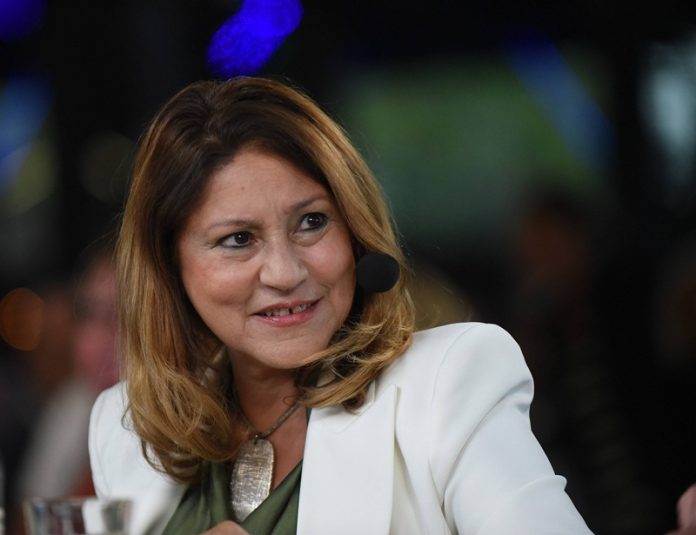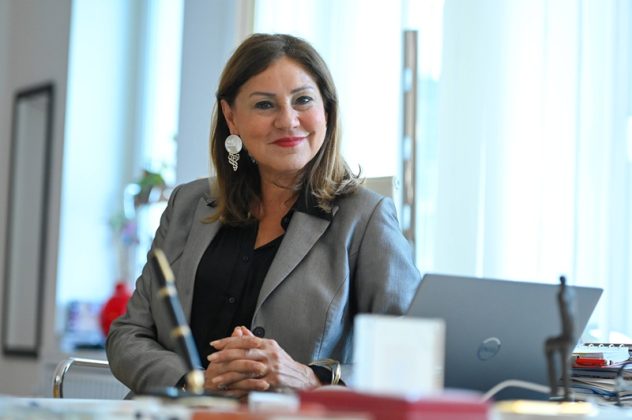By Ahmad Rafat and Kayhan Life Staff
The Iranian-born, German politician Nargess Eskandari-Grünberg is the Deputy Mayor of Frankfurt — and a vocal, lifelong campaigner for democracy and women’s rights in Iran.
She served for six months as the acting mayor of Frankfurt when the then lord mayor, Peter Feldmann, was recalled by the city’s residents for being on trial in a corruption case. Meanwhile, she led major demonstrations in Frankfurt following the death in police custody in Iran of 22-year-old Mahsa Amini, which triggered the ongoing ‘Woman, Life, Freedom’ movement.
“When I participate in demonstrations against the Islamic Republic here, I think of those inside Iran who are taking the risk of being killed while protesting,” she told Kayhan Life in an interview.
“We must stand strong, together with the people of the countries that host us, against a regime that is hostile to humanity and has held our country hostage for 46 years,” she added.
Eskandari-Grünberg became deputy mayor following the 2021 Frankfurt local elections, and has been a member of the Frankfurt City Council since 2001. She is a member of the Alliance 90/Greens party, and heads the city of Frankfurt’s Department for Diversity, Anti-discrimination and Social Cohesion.
Born in Tehran in 1965, she took part in the protests to overthrow the Shah as a high-school student. After the Revolution, she campaigned for democracy under the Islamic Republic. In 1983, when she was only 18, she and her then husband, Kasra Zaree, were arrested and imprisoned in the notorious Evin prison for protesting against the Islamic regime. She was pregnant at the time, and gave birth to her daughter Maryam while in prison.
Released from prison 18 months later, Eskandari-Grünberg fled her homeland with her two-year-old daughter for Germany in 1985. Arriving in Frankfurt with her baby girl in tow on Christmas Eve, the then 20-year-old moved into a refugee shelter.
She learned German, studied psychology, earned a Ph.D. and started her own practice as a psychotherapist working with the German Red Cross. Eventually separating from Kasra Zaree, who would spend seven years in prison in Iran, she went on to marry psychoanalyst Kurt Grünberg, with whom she had a second child.
“Iran is my country,” she said in the Kayhan Life interview. “After 30 years, all I have to do is to hear a piece of Iranian music and my soul immediately flies towards Iran. No matter how far away you are, no one and no time can separate you from your homeland.”
“When you leave your country, you bring with you a small suitcase of sadness and hope,” she added.
In 2023, Dr. Eskandari-Grünberg took part in a panel discussion on “The Iranian Struggle for Freedom: A Call for Global Solidarity” during the 15th Annual Geneva Summit for Human Rights and Democracy. Later that year, she was nominated for the Council of Europe’s North-South Prize, which rewards the commitment to the defense and promotion of human rights, democracy, and the rule of law, as well as to the development of intercultural dialogue.
Her daughter Maryam Zaree is today a successful actress, screenwriter and director in Germany, where she is known for her roles in the TV series “Doppelhaushälfte” (2022-2024), “4 Blocks” (2017-2019), the TV movie “Club Europa” (2017) and the film “Shahada” (2010), among others.
In 2019, she directed and starred in the documentary film “Born in Evin,” in which she seeks to shed light on the circumstances of her birth in the notorious Tehran prison. Her film would be the winner of the 2020 German Film Awards as Best Documentary, and she would be the recipient of the 2020 Fairness Award for Diversity at the German Screen Actors Awards.















